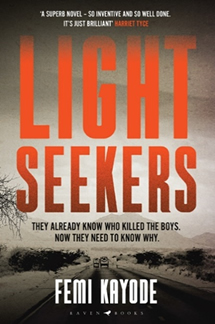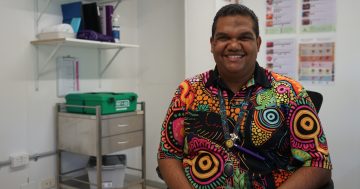Reviewed by Robert Goodman.
By Femi Kayode, Bloomsbury, $29.99.
 The true story of the lynching of four students at the University of Port Harcourt in Nigeria provided the inspiration for Femi Kayode’s debut crime novel Light Seekers. The book opens with the graphic scenes of three students being beaten by a mob before being burnt alive in the nearby township of Okriki. So that this book is not so much of a whodunnit (although in many ways it is) but a whydunnit: an exploration of why the citizens of Okriki felt empowered to take the law into their own hands. Along the way, Kayode will expose deep issues with the Nigerian university system and local sectarian fractures that can all be easily exploited.
The true story of the lynching of four students at the University of Port Harcourt in Nigeria provided the inspiration for Femi Kayode’s debut crime novel Light Seekers. The book opens with the graphic scenes of three students being beaten by a mob before being burnt alive in the nearby township of Okriki. So that this book is not so much of a whodunnit (although in many ways it is) but a whydunnit: an exploration of why the citizens of Okriki felt empowered to take the law into their own hands. Along the way, Kayode will expose deep issues with the Nigerian university system and local sectarian fractures that can all be easily exploited.
Kayode’s protagonist Phillip Taiwo is both a local and an outsider. His father is an influential member of Nigerian society but Taiwo himself was sent to America to be educated and has only just returned to Nigeria with his law professor wife Folake and his three teenage children. Taiwo is employed to look into the year-old lynching in Okriki by Emeke, the father of one of the boys, based on his specialisation which is the psychology of mob violence. The book then follows Taiwo’s investigation which involves violent university fraternity cults, anti-homosexuality laws, growing religious tension, rampant corruption and drug dealing. And in amongst it all, the crime fiction staple of italicised point of view chapters from a damaged individual who may, somehow be behind the original attack, but is also planning something far bigger.
Light Seekers demonstrates once again the appeal and range of crime fiction. Kayode uses his premise and an investigation full of secrets and obfuscation to tell a story about modern Nigeria. Kayode makes having a rudimentary understanding of Nigerian culture and history central to the plot and the motivations of the characters so that little of the explanation provided to “outsider” Taiwo feels like extraneous exposition. But Taiwo is Nigerian himself and so is in a position to analyse and comment on the information he receives for the benefit of the reader.
But like all good crime fiction, this is really about human nature. Taiwo himself is the type of flawed protagonist often found in the genre – suspicious of his wife, battling an every threatening drinking problem, quick to accuse even if it puts him in danger. And while the story is very place specific, the drivers of the plot relate to the very universal issues of abuse, religion and revenge.
Kayode understands and deploys the tropes and rhythms of the crime genre effectively to deliver a page turning thriller. But he does this to tell a story that is deeply rooted in its setting and the experiences of its characters, that brings to light a tragic event and the circumstances surrounding it that would not be widely known or understood.
This and over 600 more reviews can be found on Pile by The Bed.











